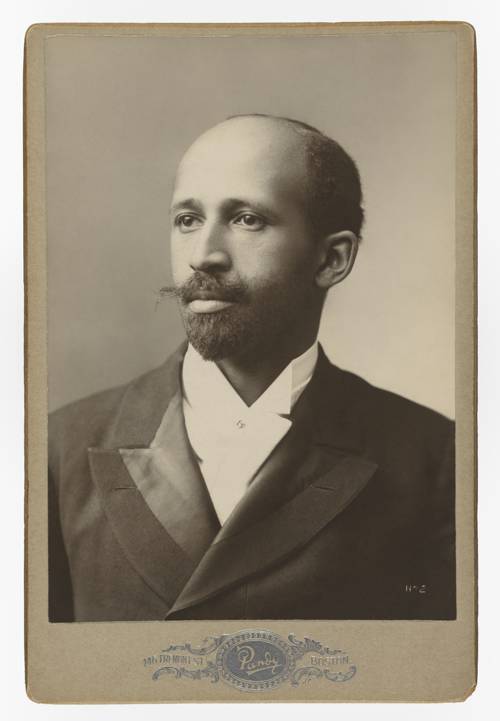
FAQ About W.E.B. Du Bois

Who was W.E.B. Du Bois?
W.E.B. Du Bois was an influential American sociologist, historian, civil rights activist, author, and intellectual, who played a significant role in the development of the civil rights movement in the United States. Born on February 23, 1868, in Great Barrington, Massachusetts, he was the first African American to earn a Ph.D. from Harvard University. Du Bois is best known for his work in advocating for equality for African Americans and his involvement in founding the National Association for the Advancement of Colored People (NAACP).

What are some major works by W.E.B. Du Bois?
Some of W.E.B. Du Bois' major works include The Souls of Black Folk (1903), which is a seminal work in African American literature and sociology; The Philadelphia Negro (1899), a groundbreaking sociological study of African Americans in an urban environment; and Black Reconstruction in America (1935), which challenges conventional views of the Reconstruction era and highlights the roles of African Americans during this period. These works, among others, solidify Du Bois' legacy as a pioneering thinker in sociology and civil rights advocacy.

What was W.E.B. Du Bois' role in the Niagara Movement?
The Niagara Movement was an important Black civil rights organization founded in 1905. W.E.B. Du Bois was one of the principal founders and a leading voice of the movement. He served as the general secretary and was instrumental in helping the organization articulate its demands for civil rights for African Americans, opposing doctrines of accommodation to discrimination which were advocated by other prominent figures at the time. The Niagara Movement laid the groundwork for future civil rights activities and organizations, including the NAACP.

How did W.E.B. Du Bois contribute to the NAACP?
W.E.B. Du Bois was one of the founding members of the NAACP (National Association for the Advancement of Colored People) in 1909. He served as the head of the organization's research and publications department, where he edited the association's monthly magazine, The Crisis. Du Bois used the magazine as a platform to highlight and raise awareness about racial injustices and civil rights issues, advocating vigorously for African American rights through his writings and editorials.

What is 'The Souls of Black Folk' about?
The Souls of Black Folk is a collection of essays by W.E.B. Du Bois, published in 1903. The work is considered one of the most important texts in American literature and African American cultural history. In the book, Du Bois explores themes of race, identity, and history, introducing the concept of "double consciousness," which describes the internal conflict experienced by African Americans due to the disparity between their African heritage and their upbringing in a society that devalues Black identity. The book remains influential in its scholarly insights and lyrical presentation.

What did W.E.B. Du Bois mean by "double consciousness"?
"Double consciousness" is a term coined by W.E.B. Du Bois in his book The Souls of Black Folk. It refers to the psychological challenge of reconciling an African heritage with a European upbringing and societal perception. Du Bois articulated this as a "second-sight" experience whereby African Americans must navigate and reconcile their identity as both American citizens and members of a race that is marginalized by mainstream society. This concept highlights the tension of identity and self-perception that arises from this dual awareness.

Why is W.E.B. Du Bois considered a pioneering sociologist?
W.E.B. Du Bois is considered a pioneering sociologist due to his innovative research and insights into race, class, and social structure, particularly regarding the African American experience. His work, notably The Philadelphia Negro, was among the first to employ systematic and empirical research methods to study urban sociology and race relations. Du Bois' ability to blend statistical data with narrative and critical theory positioned him as a trailblazer in the sociological study of race and his legacy is evident in contemporary sociological research that continues to explore these dynamics.

How did W.E.B. Du Bois' ideas differ from those of Booker T. Washington?
W.E.B. Du Bois and Booker T. Washington were two predominant leaders in African American thought, but they had differing ideologies regarding racial progress. Washington advocated for a more conciliatory approach, promoting vocational education and economic self-reliance as the means for African Americans to improve their status. Du Bois, on the other hand, emphasized the importance of higher education and political activism, arguing for immediate and full civil rights. This ideological rift is famously encapsulated in the 1903 publication of Du Bois' The Souls of Black Folk, where he critiqued Washington's approach.

What was W.E.B. Du Bois' vision for education?
W.E.B. Du Bois envisioned education as a critical tool for achieving racial equality and empowerment for African Americans. He believed strongly in higher education and intellectual development as a path to leadership and societal contribution. He argued that the "Talented Tenth," an educated elite among African Americans, should be cultivated to lead and uplift the race by setting an example and advocating for broader racial justice. This vision opposed more narrow vocational training, which he felt limited broader progress toward true equality.

How did W.E.B. Du Bois view the issue of racism in America?
W.E.B. Du Bois had a profound understanding of racism as a systemic and institutional problem deeply embedded in American society. He explored how racism affected the economic, political, and social aspects of life for African Americans. Du Bois was critical of the structural inequalities that resulted in widespread discrimination and racial violence, and he wrote extensively on these issues to foster a sense of awareness and urgency among his contemporaries and future generations. His work emphasized the need for collective activism and reform to combat these deeply-rooted inequities.

What impact did W.E.B. Du Bois have on the Harlem Renaissance?
W.E.B. Du Bois had a significant influence on the Harlem Renaissance, a cultural revival of African American art, literature, and music in the 1920s. As an intellectual leader, Du Bois encouraged and supported artists who were part of this movement, advocating for the use of art and literature as a means to challenge racial stereotypes and express the dignity of Black culture. His efforts to highlight the importance of cultural expressions were instrumental in validating the work of Harlem Renaissance artists within mainstream and academic circles.

How did W.E.B. Du Bois' views evolve later in his life?
In the later years of his life, W.E.B. Du Bois' views evolved in several ways. He became increasingly disillusioned with the slow progress of racial integration and justice in the United States. This led him to embrace socialism and later, in his lifespan, a broader understanding of global inequality, particularly in relation to colonialism. Du Bois eventually joined the Communist Party in the United States and moved to Ghana in 1961, where he continued to advocate for Pan-Africanism and passed away in 1963. His later work reflects a more global perspective on issues of race, class, and imperialism.

What was the historical significance of W.E.B. Du Bois' work, 'Black Reconstruction in America'?
Black Reconstruction in America, published by W.E.B. Du Bois in 1935, is historically significant as it redefined the narrative around the Reconstruction era following the American Civil War. His research challenged the prevailing view that Reconstruction was a failed experiment due to African American participation. Instead, Du Bois highlighted the positive contributions of African Americans and showcased the era as a time of vital democratic advancements and social change. This work reshaped historical discourse and inspired future generations of historians to seek a more accurate and inclusive interpretation of this period.

What did W.E.B. Du Bois mean by "the Talented Tenth"?
"The Talented Tenth" is a term popularized by W.E.B. Du Bois to describe the concept that a small, well-educated elite among African Americans could lift the broader community intellectually and socially. Du Bois believed that this top ten percent, through education and leadership, would play a crucial role in challenging racial stereotypes and advocating for civil rights. He saw them as pivotal in leading efforts towards equality, showcasing the potential within the African American population to contribute significantly to society if given equal opportunities.

How did W.E.B. Du Bois influence civil rights movements around the world?
W.E.B. Du Bois had a substantial influence on civil rights movements globally, particularly through his advocacy of Pan-Africanism. He was a key organizer of the Pan-African Congresses that sought to address colonialism and racial discrimination on an international scale, fostering cooperation among African and Afro-diasporic leaders. Furthermore, his writings and speeches inspired freedom fighters and civil rights activists worldwide, emphasizing the interconnected nature of struggles for justice and independence across continents.

What role did W.E.B. Du Bois play in the Pan-African movement?
W.E.B. Du Bois was a prominent leader in the Pan-African movement, which sought to unify and uplift people of African descent around the world. He played an instrumental role in organizing the Pan-African Congresses, particularly the 1921 second meeting in London, which brought together influential leaders to discuss colonialism and racial discrimination. Du Bois championed the idea of a global cast to the plight of people of African descent and worked tirelessly to foster international solidarity and cooperation. His leadership and vision were pivotal in laying the groundwork for subsequent movements for African independence and global civil rights advocacy.

Did W.E.B. Du Bois write any novels?
Yes, W.E.B. Du Bois did write novels along with his scholarly works. One of his notable fictional works is The Quest of the Silver Fleece (1911), which explores themes of race, love, and societal change through a narrative set in the American South. Although his fiction is less known than his sociological and historical writings, his novels contribute to his broader examination of race and social issues, using narrative to illuminate complex dynamics in society.

What was W.E.B. Du Bois' relationship with Ghana?
In the final years of his life, W.E.B. Du Bois developed a strong relationship with Ghana. He moved there in 1961 at the invitation of President Kwame Nkrumah, where he became involved in planning an Encyclopedia Africana. Du Bois' relocation to Ghana symbolized his deepening commitment to Pan-African ideas, connecting with the African continent both spiritually and politically. He became a Ghanaian citizen and lived there until his death in 1963, demonstrating his lifelong dedication to African and African Diaspora unity and empowerment.

When did W.E.B. Du Bois die, and what is his legacy today?
W.E.B. Du Bois passed away on August 27, 1963, in Accra, Ghana, at the age of 95. His legacy endures as a multifaceted pioneer in sociology, civil rights activism, and Pan-Africanism. Du Bois' profound contributions to scholarship, race relations, and education continue to influence thinkers and activists worldwide. His ability to blend empirical research with advocacy for social justice provides a template for integrating academic insight with activism and remains highly relevant in contemporary dialogues on race and equality.

How did W.E.B. Du Bois influence the African American intellectual tradition?
W.E.B. Du Bois had a profound influence on the African American intellectual tradition through his extensive body of work and advocacy for racial equality. His writings, including The Souls of Black Folk and his studies on race, laid the foundation for African American scholarship and activism. Du Bois pushed for a reflective understanding of black identity and intellectual empowerment, inspiring subsequent generations of African American thinkers and leaders to challenge racial inequality and cultural assumptions. His insistence on the importance of education and intellectual rigor continues to resonate in the African American intellectual and cultural narrative.
